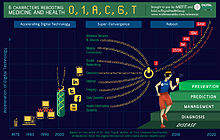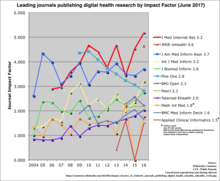Digital health
Digital health is the interdisciplinary connection of health , health care , life and society with digital technologies in order to improve the efficiency of health care and to be able to use medicines more individually and effectively.
This term includes the use of both information and communication technologies to address the health problems of patients . These technologies include both hardware - and software solutions and services, including telemedicine , web-based diagnostics , e-mail , mobile telephony , SMS , mobile devices and sensors for remote monitoring . In general, digital health is concerned with the development of networked health systems in order to improve the use of computer technology, intelligent devices, computer-aided diagnostic techniques and communication media and to help patients and health professionals deal with illnesses and health risks, or improve their health and well-being support.
Digital health is an interdisciplinary field that involves many stakeholders, including hospital staff , scientists and researchers with a wide range of expertise in health and engineering , social sciences , public welfare , economics and management .
Components
As a result of the digital revolution, a. wireless devices, sensor technologies , microprocessors and integrated circuits , the internet , social networks , cellular networks and genetic information are the key elements of digital health .
Areas
Digital health is made up of different areas. This includes the assessment and monitoring of health technology for the prevention, diagnosis and treatment of diseases, for monitoring patients, and for rehabilitation or long-term care. These technologies include aids , rehabilitation robots for people with disabilities to support their independence in everyday life, as well as inconspicuous monitoring sensors and portable devices. With the support of decision-making aids, doctors can diagnose at the point of treatment and analyze and interpret patient-related data. Computer simulations , model approaches and machine learning methods lead to health-related results.
E-health enables the connection of health information and services for data transmission, storage and retrieval for clinical, educational and administrative purposes.
mHealth is the support of medicine and public health through mobile devices. Health technology applications include research , decision making , optimization , ergonomics , quality engineering, and information technology and communication . The principles of human-computer interaction are mostly based on user-specific, experience-oriented or activity-controlled designs . Virtual reality or rehabilitation with the help of video and other games enable training and patient education as a social and interactive experience. Speech and hearing systems, speech recognition and other medical devices can support speaking and hearing (e.g. cochlear implants ). Telemedicine , tele coaching and telerehabilitation are forms of patient care from a distance.
Innovation cycle
The innovation process for digital health is divided into five main processes, starting with the identification of the health problem through research to digital solutions, their evaluation and incorporation into clinical practice.
Potential for change
As with the digital transformation , it is not yet clear to refrain from other industries, how exactly health systems by Digital Health sustainably will walk. From the multitude of small changes, however, three larger areas of change can be derived for the overall system:
- Information & prevention. The health literacy of patients is fundamentally increased, for example by using anamnesis apps to assess their state of health themselves.
- Contact points and patient flow. Approaches such as telemedicine enable other forms of contact between patients and healthcare providers. In addition, the sharing of electronic data (e.g. through electronic health records) enables patient pathways to be optimized along the entire health value chain .
- Diagnosis and therapy. The creation and distribution of health products and services are changing, for example in radiological diagnostics using algorithms (artificial intelligence).
See also
Individual evidence
- ↑ a b c d e f Sanjeev P. Bhavnani, Jagat Narula, Partho P. Sengupta: Mobile technology and the digitization of healthcare . In: European Heart Journal . 37, No. 18, May 7, 2016, pp. 1428-38. doi : 10.1093 / eurheartj / ehv770 . PMID 26873093 .
- ↑ a b c d R. Jay Widmer, Nerissa M. Collins, C. Scott Collins, Colin P. West, Lilach O. Lerman, Amir Lerman: Digital Health Interventions for the Prevention of Cardiovascular Disease: A Systematic Review and Meta-Analysis . In: Mayo Clinic Proceedings . 90, No. 4, April 2015, pp. 469-80. doi : 10.1016 / j.mayocp.2014.12.026 . PMID 25841251 . PMC 4551455 (free full text).
- ↑ a b c Digital health . US Department of Health and Human Services. Archived from the original on November 12, 2016.
- ↑ Eric J. Topol: The Creative Destruction of Medicine: How the Digital Revolution Will Create Better Health Care . Basic Books, 2012, ISBN 978-0-465-02550-3 , OCLC 868260493 .
- ^ Alfred Angerer, Robin Schmidt, Clemens Moll, Lynn Eva Strunk, Urs Brügger: Digital Health: the future of the Swiss health system . ZHAW Zurich University of Applied Sciences, 2017, ISBN 978-3-03870-010-4 , doi : 10.21256 / zhaw-3455 ( zhaw.ch [accessed May 19, 2020]).
- ^ Alfred Angerer, Christian Russ, Sabine Ultsch: Digital Health - Revolution or Evolution? Strategic options in healthcare . October 2019, doi : 10.21256 / zhaw-18267 ( zhaw.ch [accessed on May 19, 2020]).
- ↑ Deutsche Welle (www.dw.com): Anamnesis via app | DW | 06/12/2019. Retrieved on May 19, 2020 (German).
- ↑ Nick Bertram, Franziska Püschner, Ana Sofia Oliveira Gonçalves, Sebastian Binder, Volker Eric Amelung: Introduction of an electronic patient record in Germany against the background of international experience . In: Hospital Report 2019: The digital hospital . Springer, Berlin, Heidelberg 2019, ISBN 978-3-662-58225-1 , pp. 3–16 , doi : 10.1007 / 978-3-662-58225-1_1 ( springer.com [accessed May 19, 2020]).
- ↑ Thomas Weikert: Artificial Intelligence in Radiology . In: Neue Zürcher Zeitung . ( nzz.ch [accessed on May 19, 2020]).
Web links
- Institute of Digital Healthcare . University of Warwick. (English.)
- ZHAW Digital Health La b . Zurich University of Applied Sciences.

